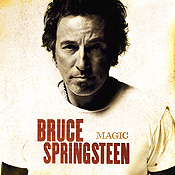 A couple of months ago I wrote an exceedingly unkind commentary for the Guardian about Bruce Springsteen’s then-forthcoming album, “Magic.” I thought the single released in advance of the album, “Radio Nowhere,” sounded generic enough to have been recorded by a Springsteen imitator. Given that his last two albums of original material were the loathsome “The Rising” (2003) and the instantly forgettable “Devils & Dust” (2005), I didn’t hold out much hope for “Magic.”
A couple of months ago I wrote an exceedingly unkind commentary for the Guardian about Bruce Springsteen’s then-forthcoming album, “Magic.” I thought the single released in advance of the album, “Radio Nowhere,” sounded generic enough to have been recorded by a Springsteen imitator. Given that his last two albums of original material were the loathsome “The Rising” (2003) and the instantly forgettable “Devils & Dust” (2005), I didn’t hold out much hope for “Magic.”
Well, now. I’ve been listening to “Magic” for a month, and I’m both chagrined at my earlier haste and pleasantly surprised. I still don’t like “Radio Nowhere,” but it’s not so bad when it kicks off his best album in many years. I realize I’m late to the party here, but I have to buy my CDs like everyone else. I figured I’d at least have my say before Springsteen hits Boston later this week.
What gives “Magic” its strength is that Springsteen has abandoned the strained attempts at profundity that marred “The Rising” and “Devils.” I’m hardly the first to say this (Springsteen himself says it here), but “Magic” is a pop album — the closest he’s come to such an achievement since “Tunnel of Love” (1987). “Tunnel,” in turn, might be his last completely satisfying album, depending on how you feel about “The Ghost of Tom Joad” (1995). I like “Tom Joad,” but I realize that a lot of people don’t.
Smack dab in the middle of “Magic” is “Girls in Their Summer Clothes,” perhaps the most perfect little pop song Springsteen has ever written. The underlying melancholy in the chorus — “The girls in their summer clothes, pass me by” — befits someone in his late 50s.
It’s not all confection by any means. There’s a current of antiwar sentiment here, stated most explicitly on “Last to Die.” The album is full of highlights, but right now I’m loving “You’ll Be Coming Down” and “Your Own Worst Enemy,” two relaxed, mid-tempo rockers. Bruce’s confidence in his material shines through in his singing, too — he’s dropped some the annoying tics that had crept in over the years, such as swallowing the ends of his lines.
A word, though, about Brendan O’Brien’s production: terrible. I don’t understand what Springsteen sees in this guy. I understand that Springsteen wants to update his sound, and some of O’Brien’s little flourishes, like the strings that open “Girls,” are nice. But the sound is muddy and distorted throughout. “Magic” is almost OK on my iPod, but it’s nearly unlistenable in my car. It’s as if I’m listening to a radio station that’s not quite tuned in.
Maybe recording last year’s fine album of old folk songs, “We Shall Overcome,” re-energized Springsteen’s writing. Other than “Girls in Their Summer Clothes,” I don’t know if we’ll be humming any of these 10 years from now. But this is a genuine comeback.



